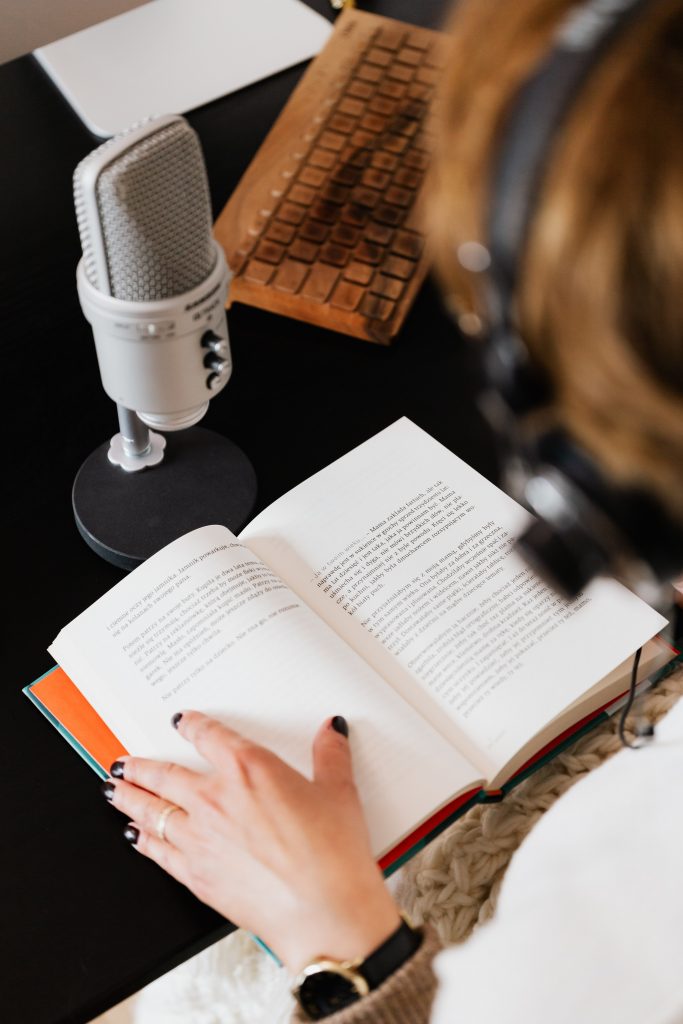Task 3: Voice to text task

The Invader
By: Alexis Reeves
The other day I was minding my own business watching TV in my living room when all the sudden I heard the sound it’s horrible horrible sound of some sort of thing I looked around and then I saw it big brown hairy moth yes that’s right I’m off in my living room I was absolutely terrified I didn’t know what to do I’ve never even seen him off here before nevermind in my living room so I decided to go into my lock myself into my bedroom and think of what to do next well in my bedroom I decided I need to be brave it’s not going to go anywhere on its own and I needed to get back out and think of a plan so I decided to pick up my broom and just started waving it around to keep the airflow so that perhaps The Moth wouldn’t get close to me while I thought it what to do so while I was doing that I thought I need to get to the other side of the room to open the window more so the moth can get out but it was very scary moment because I do not like insects and especially moss and especially don’t like them in my house so I needed to act fast to get rid of it so what I did was I kept waving the broom around and it was keeping them all the way from me I played around a bit with the lights to perhaps scare it away or let it see the window more clearly so after that as I was going to get closer to the windows open it I suddenly didn’t hear them all flopping around anymore I thought could this be it could be gone but I was a bit skeptical so so I decided to stop dropping the broom around and just listen and look around check the corners of the room and I went over to the window and I closed it shut and then I waited after about a few minutes I realized it was finally gone and I could breathe a little sign of relief because then my head I was still sure it was coming back somehow after about an hour of trying to relax and finally realizing it wasn’t coming back I vowed to never leave my window open again at night cuz all sorts of creatures sneaking any given moment and I was not here for it I kind of laughed a little bit to myself after though as I was wondering if my neighbors had heard my shrill screams and my banging around with the with the 3 month at the ceiling in the wall trying to make sure it wasn’t there all in all I was glad it was over with and have learned from my mistakes and again I am never ever leaving my window open at night again who knows what type of creatures are lurking out there in the darkness you know play jazz you and everybody else does the same Beware of the night creatures they could come in any given moment you’ve been warned
The Analysis
When initially looking at the text produced from my speech to text app, the first thing I noticed was that the text appeared to lack proper punctuation. I wasn’t sure if I was supposed to add it in by dictation and simply assumed the voice to text app would pick up on this via pauses and perhaps intonation and the tempo of my speech. When I read the text back, I realized it didn’t do so. As a teacher I know that the meaning of a text can be vastly different in the absence of proper punctuation. For example, the following sentence was transcribed using the app, “I decided to stop dropping the broom”. This would imply I was dropping the broom continuously throughout the story. However, what I said in reality would read more like this, “I decided to stop, dropping the broom.” This sentence on the other hand conveys that I was in the process of doing something at least one time with the broom and I stopped the action by putting/dropping the broom down. This was how I had intended the story to sound, rather than what was transcribed. The speech to text app also chose to capitalize ‘the moth’ in my story almost as if to make it a main character or a villain’s name as demonstrated in the following, “so that perhaps The Moth wouldn’t get close to me”. The app also capitalized some improper nouns without a period beforehand such as in this example, “same Beware of”, perhaps due to a glitch in the system. The app did, on the other hand, correctly capitalize ‘I’ and ‘TV’. These mistakes in transcribing punctuation mentioned above showcase the importance of punctuation in the process of meaning making in written text and confusion that could arise in its absence or misinterpretations.
Most of the words were spelled correctly in the transcribed text however, a mistake I found really interesting was that the voice to text app wrote ‘cuz’ instead of ‘because’. Although I do write ‘because’ in the abbreviated spelling, ‘cuz’ when sending text messages for example, I didn’t think I have ever actually said it orally. This was fascinating because I started to wonder if perhaps I have started saying these types of abbreviations that I normally text now in an oral fashion without consciously doing so. This notion of language changing or being influenced in the presence of computer technology is echoed by Schmandt-Besserat (2009) as described, “The future of writing will also be determined by communications technologies.” (p. 23)
Some of the text became distorted when the words weren’t transcribed correctly according to what was actually spoken as seen in the following sentence, “I’ve never even seen him off here before”. In reality when I spoke I said, “I’d never even seen them here before.” This and other small mistakes in transcribing were made by the app such as transcribing ‘moss’ instead of ‘moth’ or ‘windows’ instead of ‘window’ for example. Some more common mistakes found in the text were amongst the smaller words and pronouns recorded incorrectly such as “it” instead of “if” and “him” instead of “them”. I consider these mistakes as they change the meaning of the text from that which I originally intended. For example, when the app recorded the following, “I’ve never even seen him off here before” having ‘him’ replace ‘them’ implies that I knew the moth was a male moth and therefore it also implies that I was either really well-researched on moths or it could also imply that the moth was my pet and therefore I knew its gender. In reality it was neither of those things and that is where the mistake aspect comes in as the meaning and the implications of the text have changed through this improper transcription.
These mistakes made me reflect on discrepancies between oral and written texts. I thought about how history was originally passed down by word of mouth and similar to a game of telephone, small mistakes such as these could change the meaning drastically and therefore the story itself. I further reflected on how many stories had been altered throughout history before writing was invented and how it was impossible to figure out the exact origins of many things in history before writing took place.
In the end, the app captured my general story idea more or less correctly, about a moth invading my living room. The details and most of the punctuation however were incorrect leading to some confusion laced throughout. The fear and the mood I expressed orally however were not really aptly conveyed through the writing. It seems the app did not pick up on my intonation and tempo at times to add in exclamation marks to convey the fear and excitement felt at different points in the story, therefore creating a loss of emotion and tone throughout. These notions of differences in the transference from oral storytelling into written text are echoed in the following,
although writing represents information about how words are pronounced, it does not record the
identifying details of any individual utterance of those words. It records language, but not actual
speech. Even in cases of dictation or courtroom stenography, much information about the actual
speech is lost, such as intonation and emotional content. (Gnanadesikan, 2011, p. 9)
Oral storytelling becomes distorted and changes as it is passed on with details lost or swapped along the way. Therefore although oral storytelling coveys more emotion, it can be a bit more interpretative and less ordered or factual than written storytelling where the details can be revisited in the exact same fashion as they were originally conveyed over time as long as the paper or medium (web page) in which they were written is still intact and someone can read the symbols correctly. If it is a story of historical significance for example this attention to detail maintained through writing can attribute more value to the story as its meaning is more thoroughly maintained from its original intent. As described by Gnanadesikan (2011),
Writing is generally done more deliberately than speaking, so finished written pieces are much more
carefully crafted than a typical spoken sentence. Written texts can thus convey their message more
precisely, adding to the sense that writing is worth more than speech. (p. 5)
Finally, if I’d have scripted the story, perhaps it would sound more like a monologue as I would be the only character speaking throughout the play.
References
Gnanadesikan, A. E. (2011).“The First IT Revolution.” In The writing revolution: Cuneiform to the
internet (Vol. 25). John Wiley & Sons (pp. 1-10).
Schmandt-Besserat, D. (2009). “Origins and Forms of Writing.” In Bazerman, C. (Ed.). Handbook of research
on writing: History, society, school, individual, text. New York, NY: Routledge.
